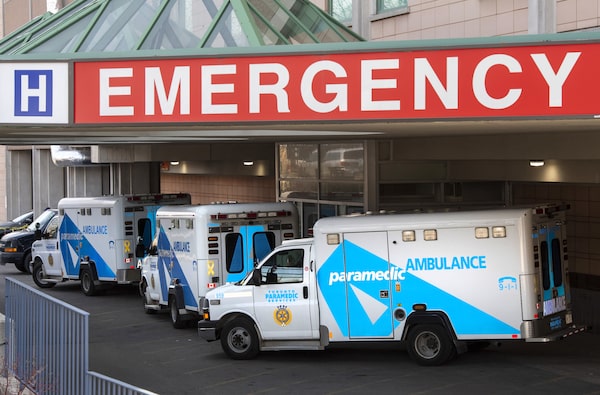
A paramedic closes the doors on his ambulance at a hospital in Toronto on April 6, 2021.Frank Gunn/The Canadian Press
Ontario physicians have been urged to ration one of only two drugs known to reduce mortality in critically ill COVID-19 patients, a harbinger of what lies ahead for other provinces if the third wave keeps rising and Canada cannot secure more of the medication.
A shortage of the anti-inflammatory drug tocilizumab is just one of the challenges Canadian hospitals face as faster-spreading and more dangerous variants overtake older versions of the coronavirus. British Columbia, Saskatchewan, New Brunswick and Ontario all have more COVID-19 patients in their intensive care units than at any other time during the pandemic.
Ontario’s tally crossed 500 for the first time on Wednesday, one day after Toronto’s Hospital for Sick Children announced it would open an eight-bed ICU for adult COVID-19 patients to help deal with the crunch.
Tracking Canada’s COVID-19 vaccine rollout plans: A continuing guide
But treating an influx of critically ill COVID-19 patients takes more than finding extra physical space, said Andrew Morris, an infectious disease physician at Toronto’s University Health Network who helped craft new guidelines for rationing tocilizumab in Ontario.
“It’s not just an ICU bed. It’s the bed and the ventilator and the people and the stuff,” he said, “which includes the drugs.”
In the case of tocilizumab, Ontario’s COVID-19 science advisory table revised its clinical guidance this week to say that, “in light of ongoing drug shortages,” the IV medication should be doled out in smaller amounts and that no patient should receive a second dose.
The change was made after several Ontario hospitals ran out of tocilizumab temporarily, forcing some to call other hospitals to plead for a back-up supply.
“On the ground, our physicians have noted that our patients really do benefit from this medication,” said Martin Betts, medical director of critical care for the three hospitals that make up the Scarborough Health Network. “We’ve been concerned about supply for over a week now and we’ve been adjusting our criteria for how we’re using it. But as of [Tuesday] night, we’ve consumed all the supply that we’ve been allocated.”
Sold under the brand-name Actemra, tocilizumab is a monoclonal antibody normally used for rheumatoid arthritis and the side effects of certain cancer treatments.
The drug mutes the activity of interleukin-6, a protein that helps regulate the body’s immune response. In severe cases of COVID-19, it is usually an out-of-control immune reaction – as opposed to the virus itself – that endangers patients’ lives.
Over the past year, doctors have tried to repurpose dozens of existing drugs as treatments for the coronavirus. Only corticosteroids and tocilizumab have emerged from clinical trials as helpful enough to be prescribed regularly for moderately and critically ill COVID-19 patients, although neither is a silver bullet.
Unlike steroids, which are cheap and plentiful, tocilizumab is still on patent, so other companies can’t make generic versions. Hoffman-LaRoche Ltd., the company that makes it, is grappling with a worldwide spike in demand because of the coronavirus resurgence fueled by the new variants.
In late February, Health Canada added tocilizumab to its list of “Tier 3″ shortages, a category denoting shortfalls with the greatest potential impact on the health care system. Health Canada then gave the company special permission to send a foreign-labelled version of the drug to Canada to help alleviate the shortage, Health Canada spokesman André Gagnon said by e-mail.
In mid-March, the federal government signed a contract with Hoffman-LaRoche to buy extra doses of tocilizumab specifically to treat COVID-19. Jennifer Mota, a spokeswoman for Hoffman-LaRoche, said the company sent 1,400 doses in March and plans to send another 1,700 this month. (There is no shortage of the drug for Canadians with rheumatoid arthritis and cancer, she added in an e-mail.)
Srinivas Murthy, a University of British Columbia infectious disease and critical care doctor who is helping lead international research on COVID-19 treatments, said he expects B.C. to start running short of tocilizumab in the next couple of weeks.
“The question, as we approach rationing, is how do we ration it best?” Dr. Murthy asked. “Is it less drug given to each patient? Is it some sort of lottery where patients are effectively randomly assigned? Is it giving it to the hospitals that have the highest burden of disease? There are all different ways we can ration, none of which are good.”
Alexis Turgeon, a critical care physician at the CHU de Québec-Université Laval, said his province has been tightly controlling use of tocilizumab and has an adequate supply for now. But he too worries about shortfalls, especially if coronavirus cases and hospital admissions rise.
In Ontario, Ministry of Health spokesman David Jensen said by e-mail on Tuesday that “the supply [of tocilizumab] is sufficient to date to meet demand for treatment of COVID-19.” The ministry is working with UHN’s senior director of pharmacy, Jin Huh, to move supplies between hospitals.
“We have been triaging to make sure that patients can get the drugs that they need,” said Dr. Huh, who also leads an ICU medication task force under the province’s critical care command table for the pandemic. He said the province expects a resupply next week.
In the meantime, Scarborough Health Network was still out of tocilizumab as of Wednesday night.
Dr. Morris of UHN said he’s heard from colleagues with limited or no supply in the past few days.
“The amount of moral distress that they are feeling in not being able to offer patients a drug that they know is likely to benefit them is heartbreaking,” he said.
Sign up for the Coronavirus Update newsletter to read the day’s essential coronavirus news, features and explainers written by Globe reporters and editors.
 Kelly Grant
Kelly Grant